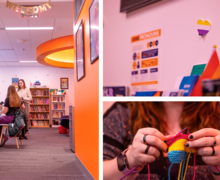Rodgers: Young people should not sacrifice relationships for career, educational pursuits
Ask any college student where they see themselves in 10 years and you’ll probably hear something along the lines of: “Settled into a high-paying career, traveling the world and enjoying all of the things I’ve worked for.”
Cool. But what about a spouse? Kids? It seems like the new “American Dream” that millennials have does not include a family. Generation Y surely has the competitive edge when it comes to education and related endeavors, but has sacrificed desires to have a family for success.
For such a driven generation that mostly has it together when it comes to academics and ambitions, we seem to have missed the mark when it comes to our personal and romantic lives. We can’t be completely matured and advanced individuals if we accept the notion that healthy relationships are a road block to success.
A popular piece published by The New York Times during the summer titled “Sex on Campus: She Can Play That Game, Too” explored the concept of “hookup culture” on college campuses and the driving role young women play in it. Through interviews with women from colleges like the University of Pennsylvania, it was found that “women at elite universities were choosing hookups because they saw relationships as too demanding and potentially too distracting from their goals.” Some young ladies even view the amount of effort it takes to have a successful relationship in college as being just as much work as a “four-credit class.”
In an interview with The New York Times that was published Sept. 13, Barnard College President Debora Spar expanded on the concept of “satisficing.” In her new book, released more than a week ago, “Wonder Women: Sex, Power, and the Quest for Perfection,” Spar suggested that women should “satisfice,” or settle for second best, in certain situations “to stop trying to be flawless professionals, mothers, homemakers, cooks and athletes … to take the pressure off.”
This should not be taken out of context to mean we should be complacent with our lives, particularly when it comes to developing meaningful relationships. Today, most young people settle for sub-par relationships, flings and romances to focus on class work, extracurricular activities and other business endeavors.
Spar also wrote that her generation “made a mistake” and took “the struggles and victories of feminism and interpreted them somehow as a pathway to personal perfection.” Millennials have done the same with social mobility. Lingering economic crises in the country have caused us to develop such paranoia and fear of financial instability that we’ve been pushed to a point where we are choosing business development instead of personal growth.
At this point, most millennials are putting off marriage and having children until at least their late 20s or early 30s. The median age for men in the United States to marry has risen to 29, while the age for women is 27, according to an article by Match.com.
Millennials have applied the narcissistic label of the “Me, Me, Me Generation” to professional growth. We still haven’t struck a balance between a prosperous career and fulfilling love life.
There is nothing wrong with dedicating a substantial amount of time, energy and effort into pursuing your dreams. That doesn’t make you a self-centered person. But there is also nothing wrong with envisioning yourself as having more than a few measly hookups in your future –– it doesn’t make you less successful, ambitious or independent.
This generation has never settled for anything less than exceptional.
When it comes to obtaining positions in the most competitive programs, internships or schools, we have risen above expectations. Relationships are no different. One does not have to be sacrificed for the other.
Nina Rodgers is a sophomore sociology major. Her column appears weekly. She can be reached at nmrodger@syr.edu.
Published on September 24, 2013 at 2:35 am





